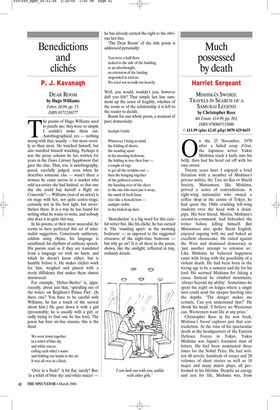Benedictions and clichés
P. J. Kavanagh
DEAR ROOM by Hugo Williams Faber, £8.99, pp. 55,
ISBN 0571230377
The poems of Hugo Williams used to puzzle me; they were so simple I couldn’t make them out. Autobiographical, yes — nothing wrong with that, usually — but more overtly so than most. He watched himself, but also watched himself watching. Perhaps it was the prose column he has written for years in the Times Literary Supplement that gave the clue. That, too, is autobiography, pared, carefully judged; even when he describes someone else — wasn’t there a woman he came across in a market who sold tea-cosies she had knitted, so that one day she could buy herself a flight on Concorde? — Williams (son of an actor) is on stage with her, not quite centre-stage, certainly not in the best light, but nevertheless there. It is a way he has found for writing what he wants to write, and nobody else does it in quite this way.
In his poems, at their most successful, he seems to have perfected this art of minimalist suggestion. Consciously unliterary, seldom using rhyme, his language is uninflated, his rhythms of ordinary speech. His poems read as if they are translated from a language we wish we knew, and which he doesn’t know either, but is humble before it. He makes clichés work for him, weighed and placed with a steely diffidence that makes them almost marmoreal.
For example, ‘Helter-Skelter’ is, appararently, about just that, ‘spiralling out of the water/ on Brighton’s Palace Pier’. (Is there one? You have to be careful with Williams, he has a touch of the surreal about him.) He goes down it with a girl (presumably; he is usually with a girl, or sadly trying to find one he has lost). The poem has four six-line stanzas, this is the third:
We went down together in a whirl of blue sky and white stucco, calling each other’s name and holding our hands in the air.
It was all over in a flash.
‘Over in a flash?’ A bit flat, surely? But: ‘in a whirl of blue sky/ and white stucco’ — he has already earned the right to the obvious last line.
‘The Dear Room’ of the title poem is addressed personally:
You were a half-floor tacked to the side of the building as an afterthought, an extension of the landing suspended in mid-air.
We tried not to walk too heavily.
Well, you would, wouldn’t you, however daft you felt? That simple last line summons up the sense of fragility, whether of the room or of the relationship it is left to the reader to decide.
Room for one whole poem, a moment of pure domesticity:
Sunlight Visible
Whenever I bring to mind the folding of sheets, the standing apart in the morning bedroom, the folding in two, then four a couple of tugs to get all the wrinkles out then the bringing together of the gathered corners, the handing over of the sheet to the one who must put it away, the smell of fresh linen rises like a benediction sunlight visible in the kicked-up dust.
‘Benediction’ is a big word for this careful writer but, like his cliché, he has earned it. The ‘standing apart/ in the morning bedroom’ — as opposed to the suggested closeness of the night-time bedroom but why go on? It is all there in the poem, shown, like the sunlight, reflected in tiny, ordinary details.










































































 Previous page
Previous page